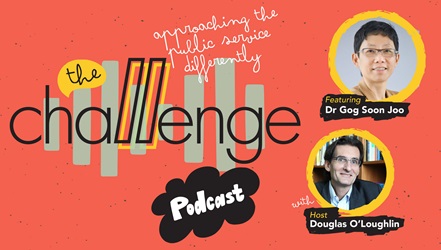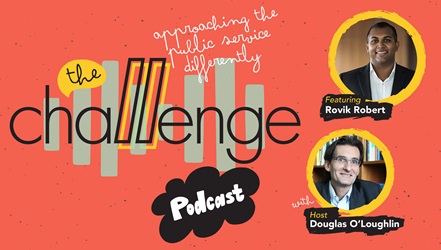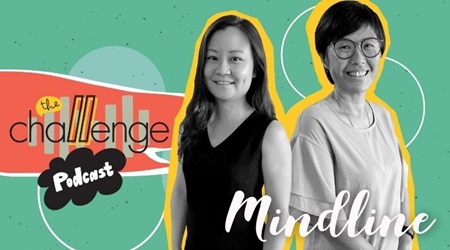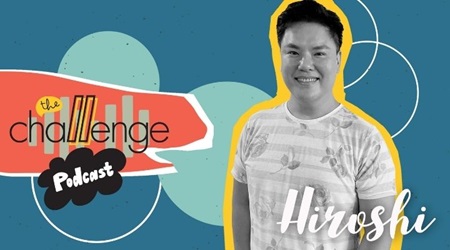Low Peck Kem on HR and Career Planning
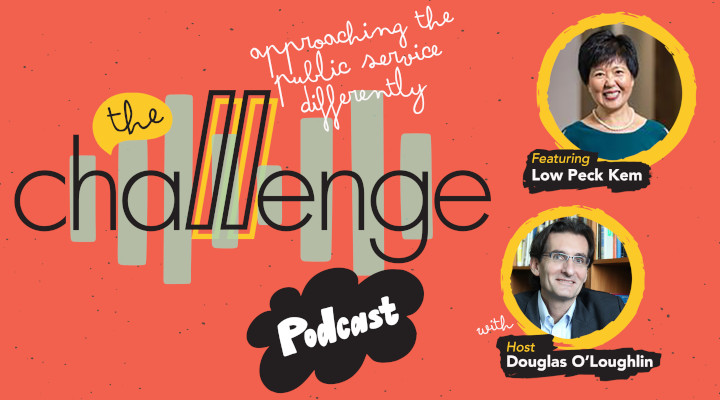
For this episode recorded in late May, we speak with someone who moved from quality engineering to becoming Chief Human Resource Officer (CHRO) for the Singapore Public Service. Ms Low Peck Kem is a big believer in taking stock of your career every five years. In this podcast, she explains why and also sheds some light on what her role as CHRO entails, and why not everyone can expect to work from home during a pandemic.
Transcript
Host: Douglas O’Loughlin
Audio: Fei
Douglas: Hello and welcome to the Challenge podcast where we discuss all things public service in Singapore. I'm your host, Douglas O'Loughlin, a consultant in organisation transformation and a former public officer. And for this podcast, we'll be speaking to public officers on a wide range of backgrounds.
Our guest today is Low Peck Kem, who went from being a quality engineer and manufacturing manager, to holding senior HR positions in the private sector, public sector and also in non-profits. She is currently Chief HR Officer for the Singapore Public Service. In addition, she is the president of the Singapore HR Institute, a board member of the institute for HR professionals, and was recently honoured with the highest international HR accolade by the Chartered Institute of Personnel and Development (CIPD) in the UK as a chartered companion.
Peck Kem: Hi, Doug!
Douglas: Hi Peck Kem! Welcome to the show. Thanks for being here.
Peck Kem: Thank you. It's my pleasure.
Douglas: One of the things we said in your intro was that you used to be a quality engineer, a manufacturing manager, and you're one of the most illustrious HR professionals in the world at this point. How did that happen?
Peck Kem: I've always been interested in people. Even though I studied engineering, I've always been intrigued by how people behave and how different processes or the kind of policies and guidelines you put in place affect people's behaviours. So this interest in people coupled with, I suppose, my engineering background, kind of taught me to look at things in a very systematic way.
And it was actually one of the manufacturing managers at Hewlett Packard, when I was a production section manager, who said, you know, you seem really good with this people management thing, and you understand the business well. So would you like to cross over to become my HR director? And for me, it was, oh wow! If you are willing and prepared to give me a shot, I'm quite prepared to make that switch to support you. So sometimes it’s timing, opportunity, as well as the willingness and gutsiness to take that risk and make a change.
Douglas: And you did it! Yeah, I think that it sounds really nice to have both that systematic way of thinking, and the people part – it sounds like a very nice combination.
Peck Kem: Yeah. We are all individually quite different. So wherever your passion lies, I would say go with your heart and you cannot quite go wrong. Because if that's something that you're interested in, you would read up on it, you would do your necessary research. And I would say whatever you put in as work is no longer work – it is something that you’re intrinsically very interested to do.
Douglas: And you also got a master's in HR from Rutgers.
Peck Kem: Yes, I did, while I was at Hewlett Packard. I already had a Bachelor's of Engineering degree from Nanyang Technological University (NTU), so I understood the business, how engineers work, how to run a manufacturing line. And I understood a bit of people management. But for me to be effective as an HR director, I needed to understand my trade. What are some of the reward strategies? What are some of the recruitment strategies? What are some of the workforce practices? I found these to be lacking in myself. So I actually told the overall HR director of Hewlett Packard: you know, I have the business background, but I don't have that functional HR background, which I need in order to provide an integrated solution to the business that I'm supporting. And that is where I think some more progressive companies like Hewlett Packard, and even the Public Service, really invest in developing their employees. So I was given the opportunity to do a Master's on a part-time basis.
Douglas: What advice would you give to public officers, or anyone else who's listening, to keep themselves employable? Like you say, part time, full time, is there anything you would recommend that people do?
Peck Kem: I would advise people to embark on some career coaching. In the Public Service, we do have a pool of coaches, and they are made free to all public officers. Go sign up and speak with one of those coaches. It could be one session, or three sessions. Coaches are trained to ask the right questions, and basically help you take stock of what you want to do for the rest of your life. Don't be too busy running your busy lives. Sometimes you just have to pause and take a breather. Take a deep breath and ask yourself, okay, is this what I want out of my life? Am I investing in myself, to get to where I want to be?
Douglas: Always a good question. How about if we go into HR a little bit? So you are now the Chief HR Officer (CHRO) of the Public Service, among the many other roles that you play. There are 145,000 people across the…
Peck Kem: 153,000.
Douglas: Okay, that's even more. And, of course, there are many different ministries, agencies, organs of state, the whole gamut of organisations, etc. What's a day in your life like given all that you're trying to manage?
Peck Kem: As CHRO for the Public Service, my primary role is to provide leadership to the HR community within the Public Service, in terms of how we uplift capabilities, making sure we put in processes and systems, so that the HR professionals within the Public Service can deliver, and can really take good care of, and give our public officers, the best opportunity to deliver their best. So in a nutshell: how do I help the HR community architect an environment where it is conducive for people to want to come to work? And when I say work environment, it is not just the workplace, it is the infrastructure you put in place, the people practices you put in place, including working from home, and so on and so forth, so that people can contribute to the best of their abilities. And looking at the workforce, how do you make sure that you can engineer the officers, and every public officer’s careers, so that they can progress, grow, learn, and acquire relevant level of skills and capabilities so that they would be ready for the future, and continue to grow? And finally, really, how can I help our HR community to really look at work and look at how to redesign that work, so that it is ready for the future? Do you need to shift some of the skills that we have for the workforce now, so that they are prepared and able to do the work that we redesign for the future? So when we train our employees, our officers, it is not training just for the here and now. It's training for the three to five years down the road. So which is why I say it's important for public officers, regardless of whether you're in HR or not, to take a pause every three to five years and ask themselves, is this going where I want to go? Am I acquiring the right level of skills and capabilities to get me where I want to go?
Douglas: Let's keep asking those questions. I've seen the amazing job you have done in creating an HR community that really didn't exist before your role in that sense. So congratulations on doing that!
Peck Kem: Thank you. Well, you're a partner in crime (laughs).
Douglas: Many people who are on the receiving end of these services often see HR as rather transactional. So how do you explain that you also have a very people-oriented function?
Peck Kem: Yeah, I think HR has come a long way. In the past, we tended to see HR as very touchy-feely kind of people that just talked about feelings and didn't understand the business. And we have been drumming very hard at HR that you need to understand the business.
If you are looking at the future, the three Ws I would call, the future of work, future of workplace, and future of workforce, you need to understand what the business is. What are some of the challenges, what are the demographic challenges that you're faced with? How is work going to change? We're using technology and AI. It’s HR’s job to make sure that we protect the workers; we don't protect the jobs. We protect the workers, we redesign the job, so that the workers will have a way to deliver and a way of making a living. So, we have shifted from an HR where it is all heart and no head to one where you want a balance. You can be soft-hearted, but you cannot be soft-headed, right? You still have to make sure that people are still being fairly treated.
At the same time, you want to drive for the kind of business results by cultivating the business of human behaviours. So in that aspect, to strike that balance would be what makes an HR department successful. But it is so easy to say that, oh, you know, PSD has all these guidelines. I’ll just follow them and won't get into trouble. But you stopped using your head, and you stopped using your heart. And when an employee comes to you and says, oh, the guideline says to work from home by default. Does that mean that even if I need to have a face-to-face interaction with a customer, I would still need to work from home? The easy answer for an administrator would be: Yes, just follow the guidelines. The guidelines say work from home by default – provided your work allows you to work from home.
Douglas: So they then blame it on you, on PSD, right?
Peck Kem: Versus if you have a good balance, where you explain the rationale of why we want people to work from home during this period. If your work involves dealing with citizens who really cannot have that transaction completed unless it's face-to-face, then by all means go back to work. And take all the necessary safety precautions to make sure that you are protected, as are the customers or citizens you are serving.
Douglas: I love this reminder of the polarity of the head and the heart. And there's another polarity not only for HR, but I think for all of us, especially anyone who manages people in any form: How do we support and be empathetic to people, especially if they have difficult home situations? And at the same time, [how do we] ask people to be accountable for their results and what they're expected to do? What advice do you have for anyone who is trying to balance performance and people?
Peck Kem: Honestly, in many instances, I get emails or feedback, from both ends, about things being unfair. Sometimes I get them from employees who will write to me and say, you know, the guideline says work from home by default. And my organisation is not letting me work from home, even though my work can be done from home. And I think it's my right to work from home. Can you please sanction the organisation or the HR of the department not allowing me to do so? My answer is, use some common sense. When we say work from home, what is the main criterion? This is not only in the Public Service. In the first place, working from home is not a right. If everybody who cannot afford to work from home also starts to stay home, how is a business going to survive? So if the business cannot survive, you can exercise all your rights for all I care, but the business is going to collapse, and you're not going to have a job. So as far as I'm concerned, the first consideration is the business requirement, what the business needs. The business also wants to make sure that our officers and our workers are protected. There is no reason why an organisation would want to force you to come to the office and expose you to the risk of transport and mingling with other people, when your work can easily be done from home.
Douglas: So would it be fair to say that one of the many reasons that HR as a function might be misunderstood is that when you try to balance or work with polarities – it is never perfect? You're trying to do head and heart, you're trying to do the needs of the organisation, and also the needs of the individual divisions or individuals. It sounds like a very challenging place to play in this system. Does it feel like that sometimes?
Peck Kem: It does. In fact, one of the things I learned when I was in HR at HP, is that in a lot of the HR practices, whatever questions you ask about HR, the answer is always: “It depends”. It depends on the timing, it depends on the context, it depends on the situation. Very seldom do you have a straightforward answer.
Douglas: Job-hopping seems to come in and out of fashion. Some people say it's a good thing to keep moving around, others that it doesn't look good on your CV. Do you have thoughts on the best way to think about that, especially for somebody who enjoys a variety of different perspectives?
Peck Kem: Well, I'm probably biased because I didn't join the Public Service from day one. I came from the private sector. And I was with nine different organisations throughout my career, and I've got more than 15 different job roles. So on average, every five years or so, I'd be doing something different. So I'm a strong supporter of taking stock of your life every five years or so, and thinking about what you want to do. I used to do this exercise with people whom I coached. And I learnt this when I was doing my Advanced Management Programme in INSEAD. And I said, think of yourself 15 years ago, how old were you? So if you are now 50, 15 years ago, you were 35. So if you ask yourself, at 35 years old, what do you want to be 15 years from now?
Douglas: Well, I was fortunate to fall into a job that I loved 15 years ago, 25 years ago and still love and still count my blessings every day. But I think I was quite fortunate in that sense.
Peck Kem: So you're quite fortunate. So if you were having that conversation with yourself 15 years ago, and this was the conversation, is there a gap? Probably not. But then if you look at 15 years from now, when you're 65, and if you have that conversation with yourself: What do you want to be at 65?
Douglas: It's a good question. Well, I've already passed 65. But if we were to make sure that I left something behind, so to speak, about the field, about the work, about life, about community and organisations, how do we make things better? So thanks. I guess that's a reminder for all of us here. That's two conversations to have, at some point – one way of taking a pause: yourself 15 years ago and 15 years in the future.
Peck Kem: Yeah. So here is the long answer to your question. Read Lynda Gratton’s (and Andrew Scott’s) book on The 100-Year Life. So in a three-stage life, in the first 20 years you front-load with education, the next 40 years you work, and subsequently retire and live for another 20 years – assuming a lifespan of 80. But if we live to 100, can we still afford to work 40 years to support 60 years of not working? You might work 50, 55 or 60 years to support 40 years of not working. But that means that for that working career, you need to pace yourself, you cannot be sprinting all the way. You will need to learn how to pace, have different phases, and have different stages. At some point in time, you may say: Yeah, I just want to take a year out, just spend quality time with my family, before you hit 80 years old. You might as well spend that time developing them and spending quality time. And what is one year in 100 years of your life? But the kind of results, the returns on the investment, is going to be humongous.
Douglas: That is really great advice. And I see some people starting to do that. And it really is about rethinking our entire life.
Peck Kem: And as we retire, we also want to make sure that we have not only retirement income adequacy, you also have to make sure that your physical and mental wellbeing are also there so that you can enjoy the retirement. The last thing you want is, you know, you increase from a lifespan of 80 to 100, but in the last 10 or 15 years you live in poor health and there’s no quality of life. You might as well not live that long, but you don't have a choice.
Douglas: Amen to that Peck Kem.
Peck Kem: Yeah. So I think our life is no longer about a one-stage career. I don't think this whole idea of staying in one same job for the whole career is going to be tenable. Increasingly, what people value is agility and flexibility in the workforce. Whether you're adaptable, whether you are able to make use of technology and make your job easier, because we are not really looking at productivity in terms of doing more with less. We are really looking at how you work smarter. By working smarter, you can cover more. But there is no more of you. You and me all only have 24 hours a day.
Douglas: This has been such an enlightening session. Is there anything else you'd like to say to the listeners out there? Parting words?
Peck Kem: I would say to all our listeners, especially to my HR colleagues: As we work so hard to try to take care of our employees, don't be like cobbler’s children. Do exercise self-care. Do invest in the time and effort to upskill yourself, to take care of yourself, take a break. I know we are putting a lot on our HR community and expecting a lot of them, especially with the pandemic and how people are reacting and how sometimes employees can be quite edgy, when we don't respond in a fast enough manner. But when we roll out any HR initiative, don't forget why you came into HR. We are doing it because we have the people at the centre of all that we do. We have all our officers at the centre of all that we do. So as we roll out something, always make sure that we have that human touch. And you may not be able to see each other face-to-face but sometimes just a phone call or WhatsApp message just to ask, how are you, are you all right, and having a little chat – can mean a lot.
Douglas: Wonderful finish, really about the purpose of what we do, who we are and who we want to be in life. Thanks, Peck Kem.
Peck Kem: Thank you Doug.
Douglas: Thank you for listening to this podcast. I’m your host Douglas O’Loughlin. Follow us for new episodes, and follow psd.gov.sg/challenge for more public service stories.

To hear more conversations like this, follow the Challenge Podcast on Spotify.
- POSTED ON
Jun 24, 2021
- TEXT BY
Keval Singh
-
Season 2: Mental Wellbeing
Mindline.SG and the Road To De-stigmatising Mental Health Issues
-
Season 2: Mental Wellbeing
The Case for Employee Wellbeing




